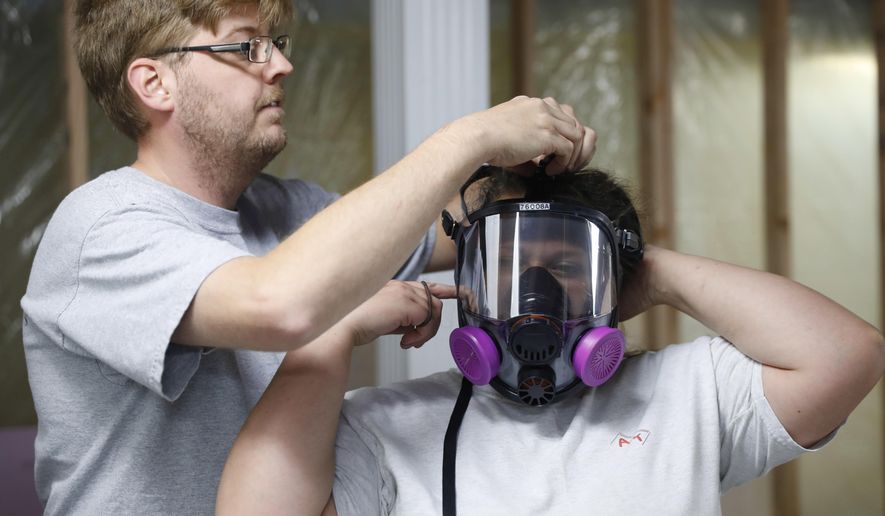OPINION:
Most of us learn from our mothers (or from “Seinfeld”) that double-dipping is a social-gathering faux pas. When it’s done not by partygoers looking for extra guac and queso, but instead by trial lawyers looking to get richer, it’s even more disgusting.
It turns out some of the nation’s richest personal injury lawyers may learn their lesson about double-dipping from another source: Law enforcement.
Asbestos litigation has been going on for decades after the substance was linked to mesothelioma, a rare and deadly form of lung cancer. Individuals who were affected by this disease sued companies that made products containing asbestos, even though that exposure often was connected to tearing those products apart while employed in the military. And despite veterans making up a disproportionate number of employee victims, you can’t sue your Navy employer.
Typically, companies have either faced individual damage claims in civil courts or created a court-authorized “trust fund” to pay future claims in conjunction with their bankruptcy. The double-dipping comes when lawyers and their clients tell one exposure story in that “trust fund” system and another in civil courts against non-bankrupt companies.
Until recently, personal injury lawyers would have said this double- (or triple-) dipping scenario was urban legend. But a few years ago, a federal judge in North Carolina looked into 15 randomly selected cases (out of 500) as part of a bankruptcy proceeding. Guess what? He found examples of evidence suppression in all 15 cases — a “startling pattern of misrepresentation,” in the court’s words. And it was that scheme of hiding the ball that made multiple claims possible.
In one example, a defendant company had paid $9 million to a former Navy man who claimed he was affected by one company’s product containing asbestos (gaskets) while denying that it could have been a different company’s asbestos-containing insulation. It was later discovered that the same plaintiff and his lawyer had filed 14 claims with other asbestos trusts claiming harm caused by different manufacturers. They filed multiple new claims for the injury that had already been sued over and settled.
Earlier this year, more than a dozen state attorneys general began investigating claims in four asbestos trust funds.
The Utah attorney general filed suit against several funds after they refused to provide information on their operations (the funds are supervised by trial lawyers). He’s worried that required reimbursements to state Medicaid coffers are going unpaid. Under federal law, if a person receives Medicare payments to treat an illness and then receives a financial settlement related to that illness, they must pay back Medicare. The investigative demands anticipate that the system is generating fraud against the taxpayers.
It turns out that Medicare doesn’t really know who gets settlements from asbestos trusts. Unlike other bodies, the U.S. Department of Health and Human Services exempted the trusts from having to report such data — essentially leaving it up to the “honor system.” Tellingly, the trusts have hired the sort of high-powered defense lawyers reserved for real trouble to thwart the attorney general’s investigation.
Just this month, Department of Justice officials — who like Utah are concerned about Medicare fraud — commented to the House Judiciary Committee that “[t]here is a general lack of transparency in the operation and oversight of post-confirmation trusts, especially asbestos trusts.” And “this lack of oversight and accountability may create opportunities for improper, unfair, or unwise conduct.”
If John Grisham needs another book idea, here’s a good one.
It’s clear why trial lawyers have wanted to keep all the trust information secret. A Government Accountability Office report calculated that asbestos trusts had $36 billion in assets in 2010 and paid $3 billion in settlements that year. The lawyers want to keep the spigot open and the money flowing.
It’s not just the taxpayers who could be getting the shaft through Medicare fraud. As a Justice Department official also noted, “The payment of illegitimate claims may dilute the amount of recoveries available” for future victims. Given that so many of those victims are veterans, the American Legion has called for transparency in the trusts.
At a minimum Congress and the states should require that asbestos trust funds publicly disclose settlements to stop the double-dipping racket. State attorneys general and the Justice Department should get further involved to determine if a bunch of already very rich lawyers are profiting by skimming off payments that should have gone to Medicare or Medicaid.
Sunlight is the best disinfectant — and a bright light well-focused will send some lawyers scrambling for cover. This is part of the swamp that needs draining.
• Richard Berman is the president of Berman and Company, a public affairs firm in Washington, D.C.




Please read our comment policy before commenting.